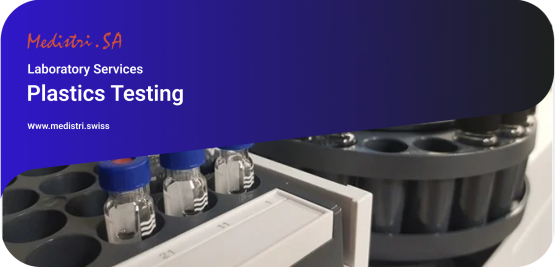(Download: Plastics Testing in PDF by Medistri)
Plastic has many unique properties in terms of its manufacturability and production potential. These properties are increasingly used in the manufacturing of medical devices and medical packaging. Despite the significant growth, the safety requirements do not change.
Plastics testing is a process that involves evaluating the compatibility, stability and integrity of plastic materials used for packaging or manufacturing medical devices that undergo sterilisation. Plastics testing can also include the analysis and screening of phthalates, which are a category of chemical compounds that are used as a form of additive in plastics.
- Plastics testing can help ensure that the plastic materials meet the regulatory requirements and do not adversely affect the quality, safety or efficacy of the medicinal products.
- To support product development, innovation and improvement. Plastics testing can help evaluate the performance, functionality and suitability of different plastic materials and products for various applications.
- Plastics testing can also help compare different materials or products, identify the best practices or methods, and optimize the production process.
- To gain a competitive edge and customer satisfaction. Plastics testing can help enhance the reputation and credibility of the manufacturers or suppliers of plastic products. Plastics testing can also help increase customer confidence and loyalty by providing reliable and consistent quality.
Medistri provides phthalate trace level detection analysis and screening of polymers and other materials.
👉 As a high degree of sensitivity and expertise is required, Medistri conduct this analysis using Gas chromatography/mass spectrometry (GC/MS) detection.
Phthalate trace level detection analysis and screening of polymers is done by using various analytical techniques that can separate and identify different phthalates in a sample. One of the most common techniques is gas chromatography/mass spectrometry (GC/MS), which can detect phthalates at very low concentrations (parts per million or ppm) and provide information about their molecular structure and mass. GC/MS involves heating the sample to vaporize it, then passing it through a column that separates the different components based on their volatility and polarity. The separated components are then detected by a mass spectrometer, which measures their mass-to-charge ratio and generates a spectrum that can be compared to a database of known phthalates.
Due to their regular usage in everyday products, there are concerns about the potential harmful effects of phthalates on human health. Some of them are classified as carcinogenic and/or mutagenic and/or toxic.
Some industries have put in place multiple frameworks to regulate the types and the levels of phthalates in wide range of products.
✔ Medistri can perform phthalate trace level detection analysis and screening of products and materials especially made of polyvinyl chlroride (PVC).
Class Plastics Testing – USP <88> is a standard developed by the United States Pharmacopeia, which covers the biological reactivity tests for plastics and other polymeric materials with direct or indirect patient contact in vivo. It is designed to evaluate the biological response of animals to elastomerics, plastics, and other polymeric materials by the injection of specific extracts prepared from the material under test or by the implantation of the material in the tissue. It is originally developed to test drug containers, but it is also used for other medical devices, implants and systems.
The standard defines six plastic classes, from class I to class VI, with class VI being the most rigorous and most frequently requested certification. The classification is based on the responses to a series of in vivo tests, which include:
- The Systemic Injection Test, which determines the systemic biological response to plastics and other polymers by the single-dose injection of specific extracts prepared from a sample.
- The Intracutaneous Test, which determines the local biological response to plastics and other polymers by the single-dose injection of specific extracts prepared from a sample.
- The Implantation Test, which evaluates the reaction of living tissue to a test material.
There’s also ISO 10993-11:2017, which specifies the procedures for the assessment of the systemic toxicity of medical devices, materials or their extracts by the injection of specific extracts prepared from the material under test.
Medistri SA is a full-service contract laboratory that offers plastics testing services according to Class Plastics Testing – USP <88> and ISO 10993-11. We have state-of-the-art instrumentation and experienced professionals who can perform reliable and accurate tests on plastic materials and products.
🎯 To learn more about Medistri’s Plastics Testing, visit on our website here or directly contact our team at contact@medistri.swiss.
- The Medistri Team
#Medistri
